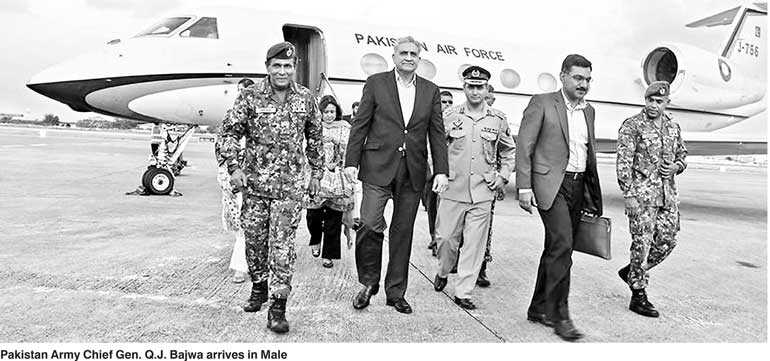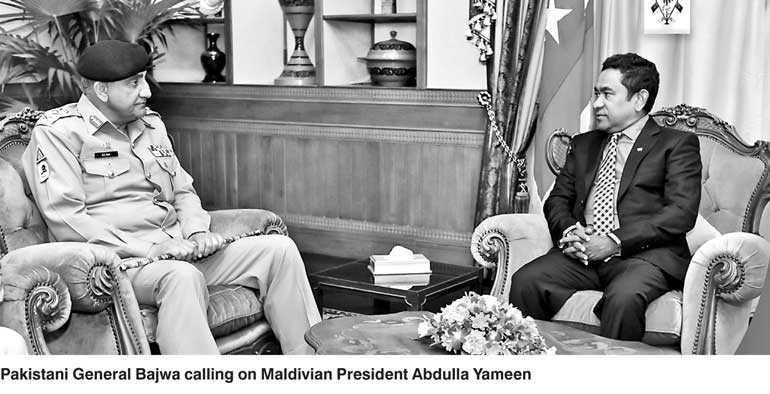Thursday Feb 19, 2026
Thursday Feb 19, 2026
Saturday, 14 July 2018 00:10 - - {{hitsCtrl.values.hits}}

The Abdulla Yameen Government in the Maldives is turning to Islamic countries in a bid to resist pressure from the West and India to restore democracy as per their prescription, and to do their bidding in economic, foreign policy and strategic matters.
While China is already there as a confirmed supporter and a powerful one at that, the Yameen regime is beefing up its defences by cultivating Pakistan, Saudi Arabia and Turkey, all avowedly Islamic countries which are also in the forefront of the international Islamic bloc.
In a way, it is natural for the Maldives to do so, because it is a 100% Muslim country. Though Maldivians are encouraged to practice a moderate form of Islam, no other religion can be practiced publicly. While all political parties in the Maldives are wedded to Islamic principles, there is an explicitly Islamist party, the Adaalath Party (AP) headed by Sheikh Imran, which was with Yameen earlier, but is now part of the Joint Opposition.
Ties with Pakistan
Among the Islamic countries Yameen is cultivating, the most significant is Pakistan because the growing relationship between the Maldives and Pakistan rings alarm bells in India.
To New Delhi, having an exclusive hold on the Maldives is a strategic imperative given the archipelago’s centrality in the defence of India’s interests in the Indian Ocean. Maldives is located 700 km from the Lakshadweep islands belonging to India, and 1,200 km from the Indian mainland. Around 97% of India’s international trade by volume, and 75% by value, pass through the Indian Ocean, and Maldives is the most strategically located littoral state there.
In 2016, the Maldivian Defence Minister had said that a $ 10 million credit line to buy military aircraft from Pakistan was on the cards. But this did not come through. However, New Delhi was alarmed when the Pakistan Army Chief, Gen. Qamar Javed Bajwa, visited Maldives in March this year at the invitation of the Commander of the Maldivian Defence Force, to discuss joint Maldives-Pakistani surveillance of the archipelago’s Exclusive Economic Zone (EEZ).
Since 2016, India has been having a project with the Maldives to keep an eye on the EEZ. Pakistan’s inclusion in this task is considered unwarranted in New Delhi especially because a large section of the Maldivian EEZ is contiguous to Indian territorial waters.
A Joint Maldivian-Pakistani surveillance of the EEZ, if finalised, will considerably enhance Pakistan- Maldives security collaboration. As on date, the cooperation is restricted to training, port visits and occasional multilateral exercises.
 The India-Maldives joint surveillance of the EEZ has been stymied by differences over the stationing of two Indian Druv helicopters and their crew. The Maldivians have been suspecting that the choppers and men are on an intelligence gathering mission. Therefore the agreement on the use of the choppers was not renewed when it expired.
The India-Maldives joint surveillance of the EEZ has been stymied by differences over the stationing of two Indian Druv helicopters and their crew. The Maldivians have been suspecting that the choppers and men are on an intelligence gathering mission. Therefore the agreement on the use of the choppers was not renewed when it expired.
The Maldivians asked India to take back the choppers but India took back only one. The Maldivians want a Dornier aircraft in place of the choppers, which they consider to be more suitable given the tricky weather conditions over the Maldives. But India considers the demand for the Dornier a cover to send back the choppers.
The Maldives also did not accept an invitation to participate in the ‘Milan’ naval exercises organised by the Indian navy in March 2018, giving the then disturbed domestic security situation as an excuse. It also did not participate in the Defence Expo near Chennai in April 2018 on the grounds that Maldives is not an arms buyer.
However, in April, a Maldivian delegation headed by Defencse Minister Ahmed Shiyam, which was attending the Defence Services Exhibition in Kuala Lumpur, requested a meeting of the head of the Indian delegation, Lt. Gen. P.S. Rajeshwar. But the South Block insisted that it would be only a courtesy call given the strained relations between the two countries.
But there was a thawing of relations in May, when an Indian naval vessel INS Sumeda was sent to conduct surveillance of the Maldivian EEZ in collaboration with the Maldivian Defence Force.
In 2016 an Indo-Maldivian MoU to set up a coastal surveillance radar system for real time surveillance of EEZ of the Maldives was signed. But the plan to set up 10 coastal radars is yet to be implemented.
Relations with Saudi Arabia
The Yameen regime is cultivating Saudi Arabia which could be a major source of support in the Islamic world. The Saudis could also invest massively in the Maldives, given Crown Prince Mohamed bin Salman’s push to reduce his country’s dependence on oil wealth.
Given the Saudis’ uneasy relations with the US led by Donald Trump, they could be of help to the Maldives which is also under a threat from the US and EU. The EU has threatened “targeted sanctions” if Yameen does not democratise his rule before the 23 September presidential election.
According to Yameen, the EU could clamp sanctions by July end. But Yameen has made it very clear that he will not back out. Therefore, confrontation with EU and US is likely to increase in intensity. In 2015, the Maldives and Saudi Arabia had signed an agreement on religious cooperation, with the Saudi financing guaranteed for ongoing mosque construction projects in the country. Additionally, the Maldives is part of Saudi Arabia’s “Islamic Military Alliance”, formed to unite Muslim-majority countries against the Islamic State (ISIS).
President Yameen and the Saudi regime share an animosity to Qatar. While the Saudis accuse the Qataris of promoting terrorism, Yameen resents Qatar’s interference in the domestic affairs of his country through its Al Jazeera TV.
The Qatar-based Al Jazeera had telecast an embarrassing expose on Yameen’s allegedly corrupt and opaque deal with the Saudi Royal family to get it to invest $ 10 billion on a luxurious city in Faafu atoll straddling 26 islands sold to them. The Saudis denied that they was such a project and Yameen denied that the islands were being sold. Prince Salman’s much trumpeted visit to the Maldives was cancelled.
However, the friendship between the Yameen Government and the Saudi regime continued to be strong. Dr. Mohamed Shaheem Ali Saeed, Chancellor of the Islamic University of the Maldives (IUM), who Yameen has chosen to be his running mate or the Vice Presidential candidate, is close to the Saudis.
It is said that Yameen chose him to help him get the votes of Islamists in Maldives and also to build close ties with Saudi Arabia.
Many fellow Islamic scholars came to Dr. Shaheem’s support when the opposition leader, Mohamed Nasheed, recently called him an “ISIS recruiter”. Shaheem is a well-known opponent of terrorism and is with the Saudis in opposing the Islamic State.
This month the Saudi Minister of Interior, Prince Abdulaziz bin Saud bin Naif, visited the Maldives and signed an agreement to fund a massive housing program for the under-privileged.
Cultivating Turkey
Turkey and the Maldives have been friendly for long. They have closely cooperated on several international platforms, including the UN and the Organization of Islamic Cooperation (OIC).
The longstanding Turkish President, Recep Tayyip Erdogan, is a firm Islamist, wanting to be the 21 century champion of Islam, and wanting to be a military and economic force in the world. The Maldives sees much to be gained by cultivating the resurgent and expansionist Turkey led by Erdogan.
Turkey could give the Maldives modern technology and finances for infrastructural development. Besides, like the Maldives, Turkey is at odds with the West, especially Europe, which has been reluctant to accept it as a ‘European’ country.
This has made Erdogan ‘Look East’ and also champion the cause of Muslims and Islamic countries. The Maldives is hoping to benefit from this. This is the reason for the much publicised visit of the Maldivian Foreign Minister, Dr. Mohamed Asim, to Turkey recently, to attend the inauguration of Erdogan’s Government after he was freshly elected.
